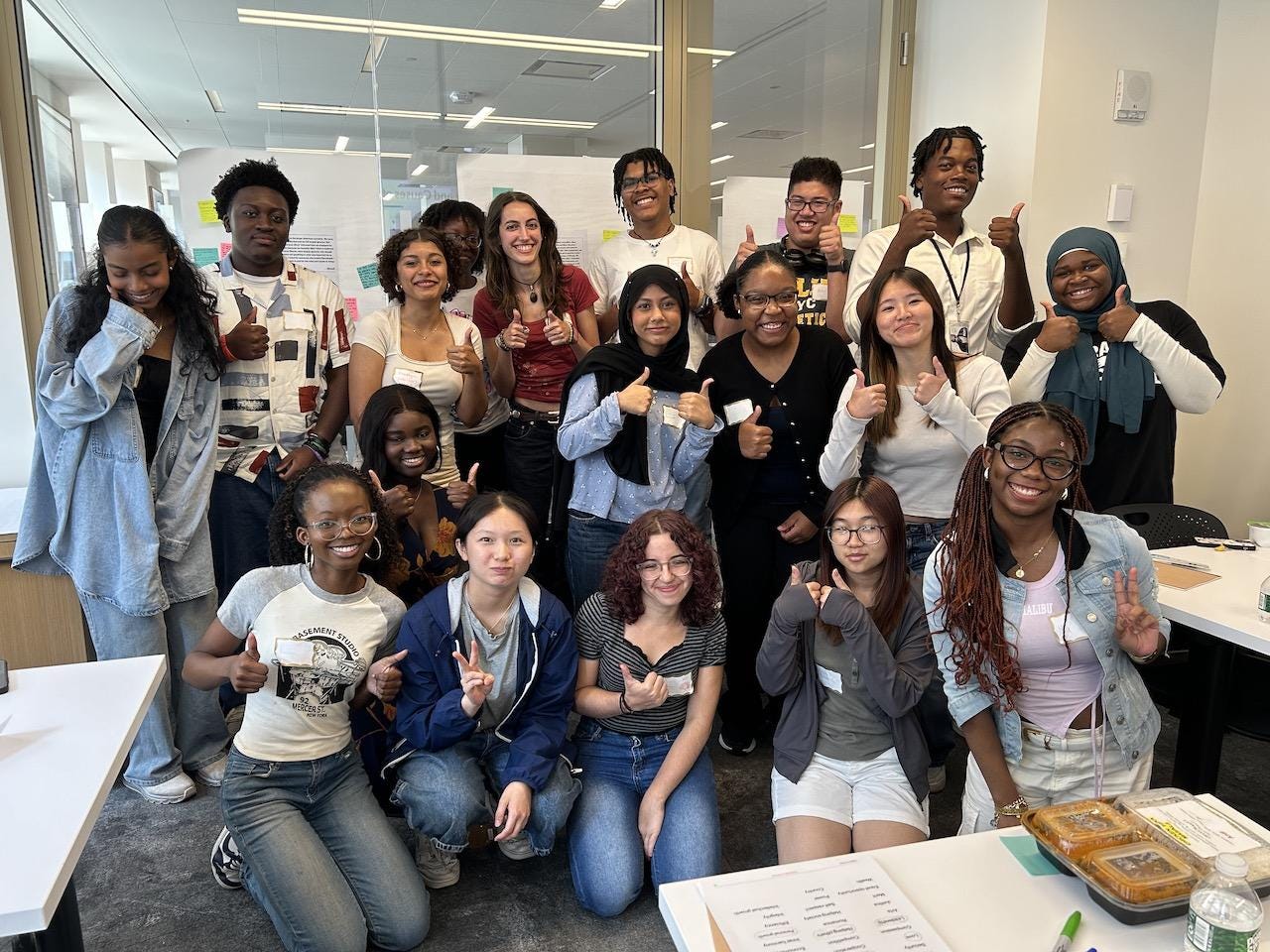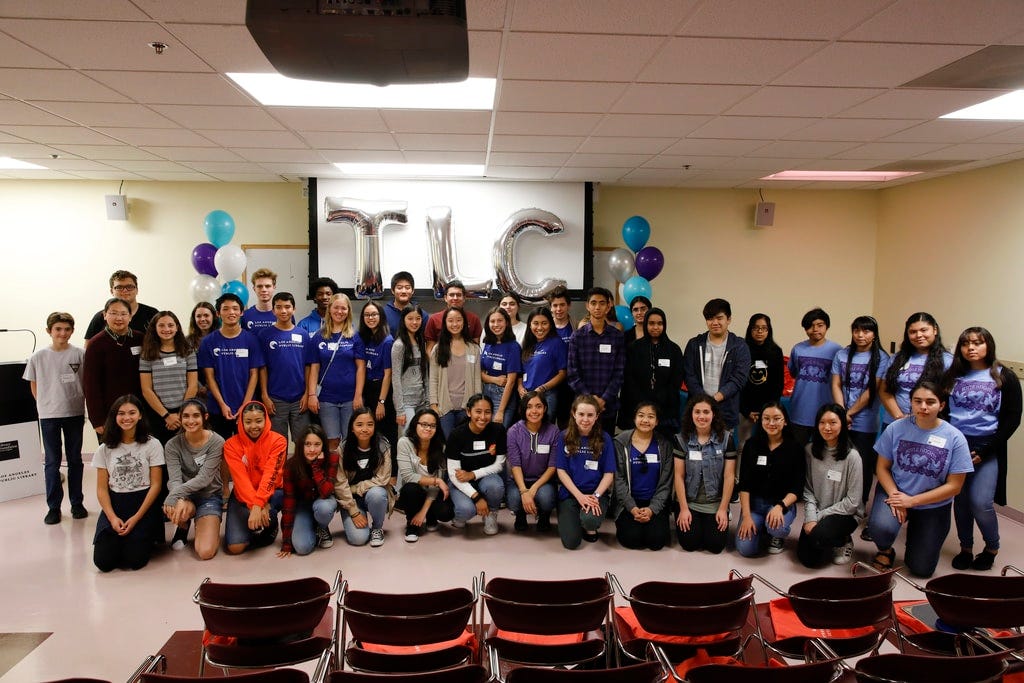A New Chapter for Civic Learning in Libraries
The Civic Work Already Happening in Libraries—and a Blueprint for What’s Next
For quite some time now, I’ve been following More Perfect’s Five Sustainable Democracy Goals with great interest. These goals, developed in response to the Our Common Purpose report from the American Academy of Arts & Sciences, were shaped not only by democracy practitioners but also through meaningful input from everyday Americans. The idea is to align efforts across all sectors of society to make real progress on these five goals by the year 2026.
Here’s a quick look at what they include:
Access to Trusted News & Information
Every American should have reliable access to high-quality, nonpartisan news—especially at the local level—so we can engage in civic life from a place of shared truth.Trusted Elections & Responsive Governance
Our democracy depends on fair, transparent elections, and leaders who are accountable to the people they serve. Building confidence in both the process and the people involved is critical.National Service & Volunteering
Service should be more than just a nice idea. In fact, it’s a powerful way to bring people together across backgrounds, build important life skills, and nurture a sense of shared responsibility.Bridging Divides
In a time of intense polarization, it’s more important than ever to create spaces where people can step outside their silos, connect across differences, and work toward common goals.Universal Civic Learning
No matter who you are or where you’re from, everyone deserves the opportunity to understand how our democracy works and how they can participate meaningfully in it.
I’ve long argued—and I know I’m not alone in this—that libraries are uniquely positioned to support all five of these goals. That said, the last two—bridging divides and civic learning—are especially ripe for deeper investment.
On Bridging Work in Libraries
Over the past few years, I’ve spent a lot of time talking about the role libraries play in helping communities connect across difference. Through the Library Bridgebuilding Project, we’ve engaged nearly 200 library professionals from across the country who are doing just that—fostering trust, empathy, and dialogue in their communities.
It’s not always easy. Even when people want to connect, they’re not always sure how to share space in a meaningful way. This gets especially complicated when libraries are navigating sensitive dynamics like how to create welcoming environments for all individuals or how to serve unhoused patrons with both compassion and safety in mind. These are real challenges, made even harder by the assumptions and stereotypes that sometimes surround those who walk through our doors.
Still, there’s hope. What we’re learning is that people do want to come together across difference. And libraries are one of the few public spaces where that kind of connection still feels possible.
Civic Learning: A Timely Opportunity
The other area I’ve been reflecting on lately is civic learning, particularly the kind that moves beyond the textbook and into real life.
A recently published white paper, Experiential Civic Learning for American Democracy, dives into this beautifully. It outlines how we can create opportunities for people—especially young people—to practice democracy in ways that feel active, meaningful, and connected to their everyday lives.
The paper makes the case that strong civic learning weaves together three strands:
Civic knowledge (how systems, institutions, and movements work),
Civic skills (like problem-solving, communication, and teamwork),
and Civic dispositions (such as empathy, agency, and a sense of belonging).
What stood out to me most was this reminder: we’re not learning about democracy just for the sake of knowing. We’re learning so that we can do—so that we can live out what it means to be a citizen.
Why This Matters to Me
In 2019, I participated in the Civic Saturday Fellowship through Citizen University, and honestly, it felt like the civics class I never got in school.
It introduced me to voices and stories that shaped our democracy, but more than that, it gave me a tool, Civic Saturday gatherings, that I could bring back home to build community. Think of it as a civic version of a faith gathering: people come together to read civic texts, share poetry, sing, and listen to a “civic sermon.” As someone who once served as a church pastor, I immediately recognized the power in that rhythm and structure, only this time, it was in service of deepening our commitment to democracy.
We hosted several of those gatherings in Memphis, first at public libraries, then at Rhodes College and Christian Brothers University. It wasn’t always easy to get folks in the room, especially younger people, but once they were there, the energy was undeniable.
That work eventually sparked a new experiment: a Civic Hackathon, where we brought together people from across Memphis for a weekend to identify pressing local issues and collaborate on creative solutions. It was messy, energizing, and full of possibility.
Together, these efforts revealed to me just how powerful out-of-school civic learning - for people of all ages - can be when approached with intention and creativity. At the time, I didn’t yet have a fully developed “civic language” to describe what I was building. But resources like the white paper continue to deepen my understanding, and help me better communicate both the impact of what’s already been done and the promise of where we, as a profession, can go next.
How Libraries Are Already Showing Up—and Where We Can Do More
In light of the white paper, I’ve been thinking about several teen-focused library programs that have already contributing to civic learning in meaningful ways. Below are three standout civic learning programs from libraries across the country. Each one created meaningful opportunities for youth to engage with democracy in real-world ways. I’ve also included suggestions, drawn directly from the Experiential Civic Learning for American Democracy white paper, for how these efforts could be enhanced in future iterations:
Teen Civics Ambassadors
New York Public Library
What it was:
The Teen Civics Ambassadors program was a paid internship at the New York Public Library that empowered high school students to design and lead civic engagement initiatives for their peers across NYC.
Civic learning contributions:
The Teen Civics Ambassadors program offered layered experiential learning by blending civic knowledge (e.g., how government works), civic skills (e.g., public speaking, survey design, peer engagement), and civic dispositions (e.g., agency, confidence, sense of community).
Opportunities to enhance (per the white paper):
Encouraging collaboration between cohorts from different neighborhoods or boroughs could foster engagement across political, cultural, and socioeconomic lines—helping to build social trust and reduce polarization over time.
Add civic career spotlights by bringing in guest speakers from public service, local government, policy, and nonprofit leadership to illuminate career pathways rooted in civic work.
Teens Leading Change
Los Angeles Public Library
What it was:
A a citywide initiative by the Los Angeles Public Library that trained staff to mentor Teen Council volunteers as they designed and led community empowerment projects—ranging from disaster preparedness events to civic education programs—ultimately engaging over 3,000 teen volunteers across multiple library branches.
Civic learning contributions:
The program provided experiential civic learning by empowering teens to take on leadership roles in community projects, fostering skills in research, collaboration, and public engagement, while deepening their understanding of civic responsibility and democratic processes.
Opportunities to enhance (per white paper):
Simulate participatory budgeting: Give teens mock budgets (or real microgrants) and have them collaboratively decide how to allocate resources for their project, practicing negotiation and fiscal responsibility.
Mentor across generations. Build a peer-mentoring structure with alumni to support long-term civic identity and leadership development—aligned with the paper’s emphasis on role continuity.
Include a “Policy in Action” day at City Hall: Partner with local officials to allow teens to sit in on hearings, meet with public servants, and experience participatory citizenship firsthand.
Teen Voices Summit
King County Library System, Wash.
What it was:
The Teen Voices Summits were youth-led, day-long regional events coordinated by King County Library System’s teen advisory board, where teens took full ownership of planning and implementation—including topic selection, budgeting, presenter coordination, and leadership roles—while developing transferable 21st-century skills like civic literacy, collaboration, and communication.
Civic learning contributions:
The program provided a robust experiential learning environment by placing teens in authentic civic leadership roles, fostering civic agency, collaboration, and perspective-taking—while also deepening their understanding of democratic practices like deliberation, negotiation, and public engagement.
Opportunities to enhance:
To strengthen long-term impact, the program could integrate structured reflection on civic identity and values, simulate democratic processes like community board decision-making, and implement follow-up assessments to measure shifts in civic dispositions, agency, and ongoing engagement.
Final Thought
Each of these programs shows what’s possible when libraries lean into their role as civic learning hubs. By incorporating more intentional reflection, role immersion, and evaluation, as outlined in the white paper, we can make these powerful learning experiences even more transformative.
In addition to programs that have already happened, I’ve been thinking a lot this weekend about what new library frameworks and programs could be launched—and what kind of funding, partnerships, and infrastructure are needed not just to get them off the ground, but to scale them to other cities and sustain them over time. I look forward to sharing more of those ideas with you next week.
Best,
Shamichael



